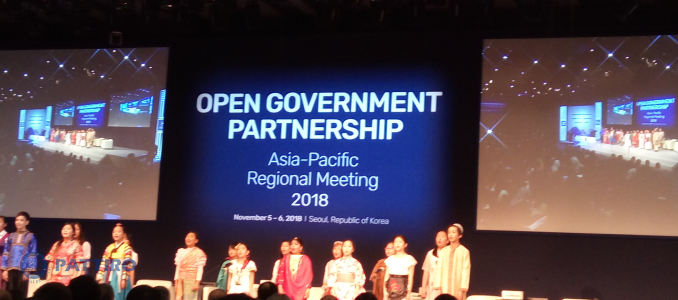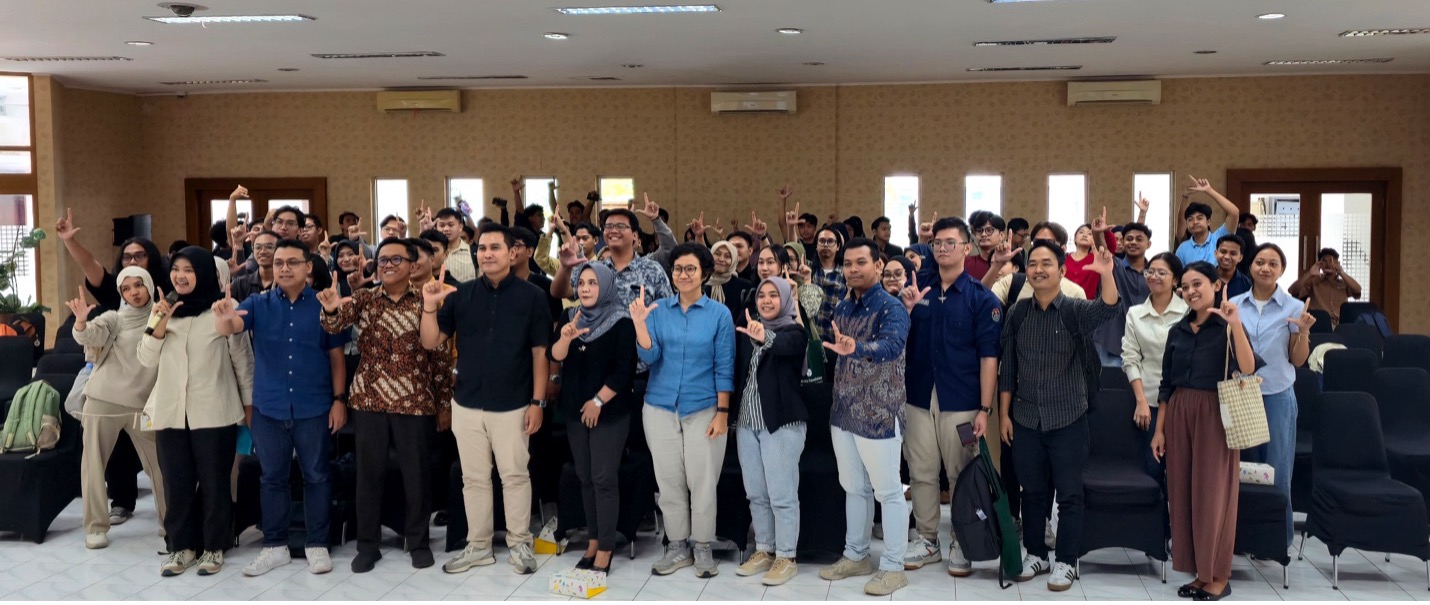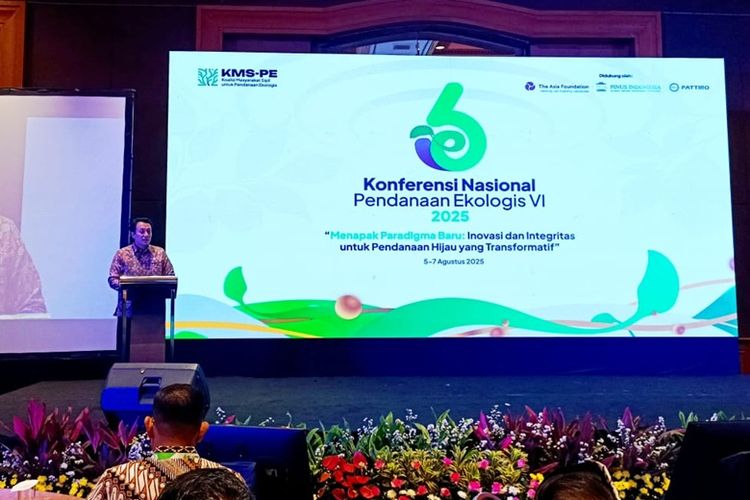Report from the OGP Asia Pacific Conference in Seoul, South Korea, 5-6 November 2018
“Her name is Juniati. Married at 14 years old and pregnant at 16 years old. She is a pregnant woman at high risk, because biologically her reproductive organs are still not ready to conceive.”
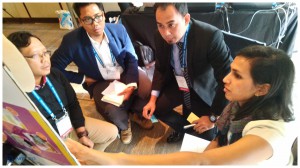 The explanation of the sentence above was conveyed loudly by Hadi Kusyairi, Head of the Sempu District Health Center, Banyuwangi Regency, East Java at one of the discussion sessions at the Asia Pacific Open Government Partnership (OGP) conference in Seoul, South Korea on November 5-6. While showing a picture of Juniati’s figure on the projector screen, in the session which was also attended by PATTIRO, Hadi continued his story that there are still many high-risk pregnant women (pregnant women) in his work area. Finally, there were around 300 more pregnant women, most of whom lived in the middle of the forest and far from access to health facilities.
The explanation of the sentence above was conveyed loudly by Hadi Kusyairi, Head of the Sempu District Health Center, Banyuwangi Regency, East Java at one of the discussion sessions at the Asia Pacific Open Government Partnership (OGP) conference in Seoul, South Korea on November 5-6. While showing a picture of Juniati’s figure on the projector screen, in the session which was also attended by PATTIRO, Hadi continued his story that there are still many high-risk pregnant women (pregnant women) in his work area. Finally, there were around 300 more pregnant women, most of whom lived in the middle of the forest and far from access to health facilities.
“To get to the Community Health Center, they have to walk for three hours. “That’s why it often happens that many pregnant women cannot be saved because when they arrive at the Community Health Center their condition is very serious,” said Hadi further.
On this basis, Hadi took the initiative to form an army of Bumil Risti Hunters consisting of itinerant vegetable sellers who usually sell in remote villages. These hunters are tasked with detecting the presence of pregnant women and immediately reporting it to Community Health Center officers or health cadres. These hunters are equipped with red vests that say “Pregnant Risti Hunters” on the back, complete with banners with 13 indicators of pregnant women displayed on their respective vegetable carts. This banner not only makes it easier for hunters to detect, but also serves as a medium for socialization and learning for residents.
Even though it seems simple, Hadi’s innovation is considered special because it has a big impact on reducing maternal or newborn mortality rates. It is not surprising that some participants expressed their appreciation for this innovation.
The OGP global initiative launched in 2011 has had a positive influence on more innovative and collaborative governance in Indonesia. This movement continues to roll out so that it can encourage the government to be more open in accepting creative ideas. This movement also encourages the government to continue to open itself to public participation, so that governance can also involve the public more broadly. What Hadi has done proves that innovation and collaboration are the main keys to improving public services.
Another innovation model in the public service sector that has been implemented is the development of a website-based complaint application called LAPOR!, an acronym for People’s Online Aspiration and Complaints Service. On the same occasion, Muhammad Gibran from the Presidential Staff Office (KSP), as the party who developed this application, explained that this platform was created to make it easier for citizens to submit complaints regarding public services to the government. Through this platform, residents can directly write their complaints and KSP will immediately respond. From there, KSP then forwards it to the relevant government agencies.
“The principle of public service is no wrong door policy. REPORT! “allows residents to convey any complaints, and our task is to forward them to the institutions concerned,” said Gibran further.
To further reach public service providers down to the lowest level, KSP and the Ministry of State Apparatus Empowerment and Bureaucratic Reform (KemenPAN-RB) continue to encourage local governments to connect with LAPOR!. Currently there are 303 local government institutions that have been connected to LAPOR!.
Challenge
Responding to Gibran’s presentation, Bejo Untung from PATTIRO said, apart from the success story of LAPOR!, there are still challenges to be faced. One of them is that there are no employees specifically dedicated to managing LAPOR! in the area. So far, no employee has managed LAPOR! because the employee rotation process is very fast. “For this reason, PATTIRO together with KemenPAN-RB have prepared a draft government regulation which regulates the formation of functional positions. “Currently the draft is being drafted by the deputy for human resources at KemenPAN-RB,” said Bejo.
Apart from that, another challenge is related to sustainability. Even though it is quite influential, no one can guarantee that this innovation will continue to operate. According to Marina Mkhartayan from UNDP Armenia, overcoming this challenge can be supported by implementing a feedback loop mechanism so that the public also carries out continuous monitoring. Marina further said that wider public involvement in the feedback loop scheme allows this system to continue, because there is massive supervision from the public. Public satisfaction with the benefits of this application is also important so that the public becomes more confident in trusting this application.
Gibran recognized these challenges. He hopes that through the involvement of many parties these challenges can be answered well. Gibran also realized that currently the management of complaint data has not been carried out properly. In fact, according to him, this data is very important to manage and analyze so that it can become a base line for systemic and lasting improvements in public services.
Development REPORT! itself will continue to be carried out because it is included in the Open Government Indonesia action plan for 2018-2019.
Overview of the 2018 OGP Asia Pacific South Korea Conference
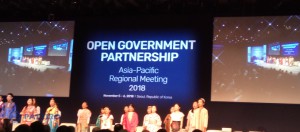 The 2018 OGP Asia Pacific Conference is an initiative of the South Korean Government as one of the members of the OGP Global steering committee. This forum is provided as a place to share experiences and success stories for both member and non-member countries in the region, related to the implementation of open, participatory and accountable governance. A total of 24 discussion sessions were held in this event. Apart from public services, other themes discussed in these discussion sessions include openness in procurement of goods and services, openness of elections and parliament, budget, mainstreaming gender, freedom of speech, and open data innovation.
The 2018 OGP Asia Pacific Conference is an initiative of the South Korean Government as one of the members of the OGP Global steering committee. This forum is provided as a place to share experiences and success stories for both member and non-member countries in the region, related to the implementation of open, participatory and accountable governance. A total of 24 discussion sessions were held in this event. Apart from public services, other themes discussed in these discussion sessions include openness in procurement of goods and services, openness of elections and parliament, budget, mainstreaming gender, freedom of speech, and open data innovation.
The conference, which was held at the Westin Chosun Hotel in Seoul, was attended by participants from various elements including government elements, civil society groups, quasi-state institutions, students, academics and private groups, including from Indonesia, the Philippines, Papua New Guinea, New Zealand, Pakistan. , Sri Lanka, India, Bangladesh, Nepal, Afghanistan, Georgia, Armenia, Australia, Kazakhstan, Jordan, Uzbekistan, Ukraine, Mongolia, Kyrgystan, Vietnam, Singapore, Thailand, China, Taiwan and Fiji. Also present were delegations from the United States, Argentina, Paraguay, Nigeria and Colombia.

